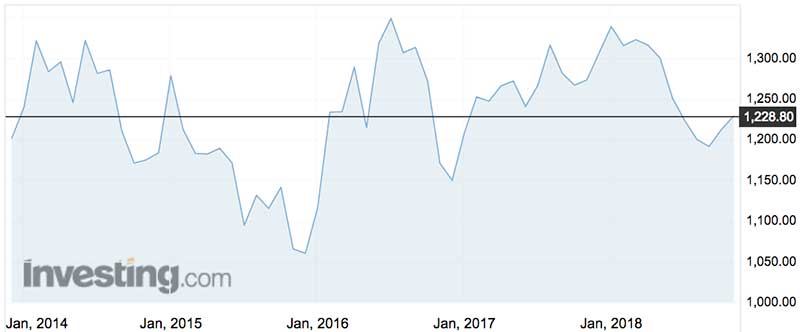What affects the price of gold and how it impacts ASX stocks

Pic: Stevica Mrdja / EyeEm / EyeEm via Getty Images
Here’s a plain-language guide to how the price of Gold is determined and how it affects ASX gold stocks by Stockhead’s data guru Nick Sundich
There more than 400 ASX stocks with exposure to gold projects in Australia and around the world.
Apart from an uptick over the past month 2018 hasn’t been a great year for the price of gold — which determines returns from ASX-listed gold explorers.
After hitting a year-high of $US1365 in January it’s mostly been downhill from there. The price bottomed out at $US1161 in August and has since rebounded to around $US1230.
How is the price determined? Supply and demand?
In short, yes, but it is not that simple — particularly for investors used to equity markets where there is a single price for a single equity.
The “price of gold” is usually not determined by the quantity and quality of gold. Rather it’s determined by trading of gold and by futures contracts on multiple exchanges.
While governments, central banks and investors do indeed hold physical gold bullion, it’s not just the real thing that determines price.
The gold price can refer to gold futures or the gold spot price and it can allude to multiple gold markets, notwithstanding it is unlikely they would diverge significantly.

Spot price vs futures price
Simply put, the spot price is the price a physical amount of gold could be bought or sold at.
It’s determined by an independently administered auction — which these days is conducted electronically. The London market sets a benchmark price twice daily at 10.30am and 3pm UK time.
Tens of billions of dollars of gold is traded every day. You may sometimes hear the term “Over the Counter” or OTC in relation to these gold transactions. OTC may also allude to private sales between independent traders.
Futures contracts are in effect gambling on future prices of commodities. Equity futures (such as the ASX futures) are used by analysts as predicting the way the sharemarket will go that day.
In the case of gold, gold futures are the price of a lot of 100 oz of gold at a future delivery date, negotiated between traders.
Usually these are settled in money rather than gold and the amount of money is usually not the exact figure as the spot price. Traders will strive to make money irrespective of the direction gold prices go and some will be able to.
The biggest gold market is the COMEX, which is on New York Mercantile Exchange. This is where most futures contract trading takes place.
The oldest gold market is the London Bullion Market Association, which began in 1697. The biggest bullion market is China’s Shanghai Gold Exchange.
Other price factors
Beyond supply and demand, the gold price is determined by multiple other factors, some of which also influence equities, geopolitics, interest rates, currency fluctuations, government fiscal positions and consumer sentiment in relation to these and many other factors such as oil.
Unlike oil and gas, there is little geopolitics in the gold market. Gold is relatively unaffected by inflation in any one country – which is why governments hold gold.
There are also no signs of a “replacement” for gold, whereas there as replacement energy sources are emerging in respect of oil.
The impact on ASX gold stocks
Ultimately all these factors flow back to affect individual ASX-listed gold stocks.
The higher the price of gold, the more likely a explorer will generate a return on their investment if they find gold.
A gold explorer must consider the costs of exploring and digging up gold — as well as the costs of refining it. Refining is a precise process that must meet a gold exchange’s standards.
The London Bullion Market requires gold bars to be at least 99.5 per cent pure gold and come from a certified refiner.
Not all gold is sold on an exchange. It might be stored in a bank or sold directly to another party such as a jewellery maker — but all buyers wil operate to their own standard.
Are you investing in gold just by investing in an ASX-listed gold explorer?
Not exactly.
Most explorers simply extract the gold and on-sell it to refiners and exchanges.
Gold markets are a different kettle of fish to equity markets. Nevertheless, the better off the gold markets are, the better returns investors will generate from gold explorers.
UNLOCK INSIGHTS
Discover the untold stories of emerging ASX stocks.
Daily news and expert analysis, it's free to subscribe.
By proceeding, you confirm you understand that we handle personal information in accordance with our Privacy Policy.








